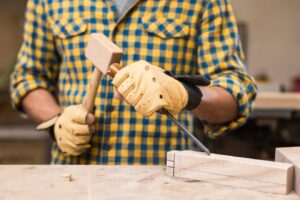The DIY & Crafts Blog
Modular Homes Explained: What Buyers Should Know Before Building in 2025
Understanding Modular Homes: A Modern Housing Solution
Modular homes are revolutionizing the way we think about residential construction. Built in factory settings and assembled on-site, these homes offer a unique blend of efficiency, affordability, and design flexibility. In 2025, as more people seek sustainable and cost-effective housing solutions, modular homes are becoming increasingly popular. This shift is driven by several factors, including faster construction timelines and reduced waste, which are crucial in today’s environmentally conscious world.
Unlike traditional homes that are built entirely on-site, modular homes are constructed in sections or modules in a factory. These modules are then transported to the building site and assembled into a complete home. This method offers numerous advantages, such as reduced construction time and improved quality control. Since the modules are built in a controlled environment, they are less susceptible to weather-related delays and damage.
The appeal of modular homes extends beyond just the construction process. They offer a wide range of design options, allowing homeowners to customize their living spaces to suit their needs and preferences. From modern, minimalist designs to more traditional styles, the possibilities are virtually endless. Additionally, modular homes are often more energy-efficient than their traditional counterparts, as they are built to meet strict energy codes and standards. This focus on efficiency not only reduces utility bills but also minimizes the environmental impact.
Key Benefits of Choosing Modular Homes
One of the primary benefits of modular homes is their affordability. By streamlining the construction process and minimizing waste, modular homes can be more cost-effective than traditional homes. This is particularly appealing to first-time homebuyers and those looking to downsize. Furthermore, the controlled factory environment allows for better quality control, ensuring that each module meets high standards before it is transported to the site.
Another significant advantage is the speed of construction. Traditional home building can take several months, if not longer, depending on weather conditions and other factors. In contrast, modular homes can be completed in a fraction of the time. This rapid construction process is not only convenient but also reduces the overall cost of the project, as labor and financing expenses are minimized.
Modular homes are also known for their durability and resilience. Built to withstand transportation and assembly, these homes are often stronger than traditional homes. This strength can be particularly beneficial in areas prone to extreme weather conditions, such as hurricanes or earthquakes. Additionally, modular homes are designed to be easily expanded or reconfigured, offering homeowners flexibility as their needs change over time.
Design Flexibility and Customization Options
One of the most attractive features of modular homes is their design flexibility. Unlike traditional homes, which may have limitations due to site conditions or local building codes, modular homes offer a wide range of customization options. Homebuyers can choose from various floor plans, finishes, and features to create a home that perfectly suits their lifestyle and aesthetic preferences.
Modular homes can be designed to accommodate different architectural styles, from contemporary to classic. This versatility allows homeowners to achieve the look and feel they desire without compromising on quality or functionality. Additionally, modular homes can be tailored to meet specific needs, such as accessibility features for individuals with disabilities or energy-efficient upgrades for those looking to reduce their carbon footprint.
Another advantage of modular homes is their ability to incorporate the latest technology and smart home features. Many manufacturers offer options for integrating advanced systems, such as energy-efficient heating and cooling, solar panels, and home automation. These features not only enhance the convenience and comfort of the home but also contribute to long-term savings on utility bills.
Environmental Impact and Sustainability
As environmental concerns continue to grow, more people are seeking sustainable housing options. Modular homes offer several eco-friendly benefits that make them an appealing choice for environmentally conscious buyers. The factory-based construction process generates less waste compared to traditional building methods, as materials are precisely cut and used efficiently.
Additionally, modular homes are often built with energy efficiency in mind. Many models are designed to meet or exceed energy codes, incorporating features such as high-quality insulation, energy-efficient windows, and advanced HVAC systems. These elements not only reduce the home’s carbon footprint but also lower energy costs for homeowners.
Furthermore, modular homes can be constructed using sustainable materials, such as recycled steel or eco-friendly wood products. This commitment to sustainability extends beyond the construction phase, as modular homes are designed to be easily deconstructed and recycled at the end of their lifespan. By choosing a modular home, buyers can enjoy a comfortable living space while minimizing their impact on the environment.
Considerations Before Investing in a Modular Home
While modular homes offer numerous advantages, there are several factors to consider before making an investment. One important consideration is the availability of land. Buyers will need to secure a suitable plot for their home, taking into account factors such as zoning regulations, access to utilities, and proximity to amenities.
Financing a modular home can also differ from traditional home financing. Some lenders may be unfamiliar with the modular construction process, which could affect loan terms and conditions. It is essential for buyers to research financing options and work with lenders who have experience in modular home loans.
Lastly, it is crucial to choose a reputable manufacturer and builder. The quality of a modular home largely depends on the expertise and experience of the company responsible for its construction. Buyers should thoroughly research potential manufacturers, reading reviews and seeking recommendations to ensure they select a company that meets their needs and expectations.
By carefully considering these factors and conducting thorough research, buyers can make informed decisions and enjoy the many benefits that modular homes have to offer.









